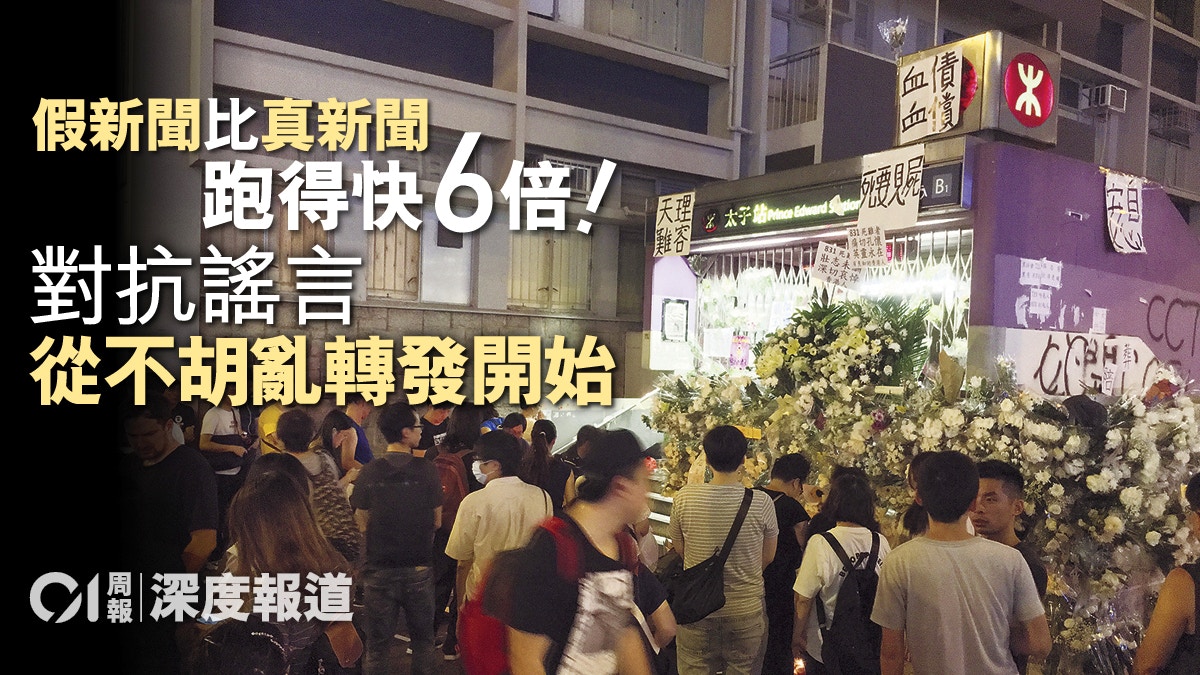weekly
Written by: Yang Yingwei
2021-04-26 18:00
Last update date: 2021-04-26 18:05
Having experienced the anti-amendment turmoil and the new crown pneumonia epidemic, Hong Kong has fallen into the quagmire of the "post-truth era"-"regardless of the facts, stand first."
Under the cover of position, many fake news spread like a virus on social platforms, deepening social tears.
A democratic society needs rational dialogue, and the basis of dialogue is the correct perception of facts.
There is no real democracy in a society flooded with fake news, but it will lead to populism and violence.
The School of Communication of Hong Kong Baptist University announced the establishment of a "Fact Checking Center" earlier, hoping to use the power of technology and academics to combat fake news, promote the improvement of the media literacy of the whole people, and help Hong Kong return to rationality.
At the end of last year, Channel 4 broadcasted a special Christmas message-"Queen of England" actually made a TikTok video during the announcement and danced to the camera.
It turned out that this was not the real queen. Instead, it used "Deepfake" and artificial intelligence (AI) configuration to place the queen's face on other actors. It was the actor who danced, not the queen.
The original intention of the TV station was to issue a "serious warning" against fake news in the digital age-what we believed in the past to see is believing, now may be an illusion under AI technology.
Last year, on British Channel 4, the "Queen of England" produced by Deepfake danced and made a TikTok video when publishing a Christmas message.
(Reuters)
"The video must be true to the photo, and the photo must be true to the text. These theories are no longer valid," said Li Wen, director of the Institute of Journalism and Society of Hong Kong Baptist University and co-director of the Fact Check Center.
–Challenge – AI helps accelerate the spread of fake news on social media
Deepfake is just an example of fake news using AI technology.
Wang Minghao, a data analyst and research assistant at the Fact Check Center, pointed out that academia and the industry have already begun to study the phenomenon of AI making fake news.
"You may have heard robots writing. Robots can write financial news, sports news, or fake news." He said, "Whether it is a robot spreading fake news or inciting public opinion, it is actually not a new topic. Up."
Under the tremendous technological changes, many types of "variants" of "fake news" have appeared, and it is difficult for citizens to identify and judge with common sense.
In the traditional definition, "fake news" refers to false reports.
With the changes in the media ecology, the coverage of "fake news" has expanded. In addition to basic factual errors, it also covers news that separates facts from context and splices information; news that adds facts to inflammatory language for exemplifying opinions; and information News whose source is unknown and difficult to be verified.
For example, the Queen of England dancing mentioned above is the last category. If the TV station hadn't declared it as a "fake queen," and the audience hadn't been in contact with the British royal family, how could they verify it with their naked eyes?
The picture shows the real photo of the Queen of England’s Christmas proclamation last year.
Comparing the above picture carefully, you will find that the two photos are extremely similar, making it difficult to identify with the naked eye.
(Reuters)
In addition to the development of technology, there is also the strong rise of social media, which also brings greater challenges to the information environment.
Although "fake news" has the word news, it is not necessarily produced by traditional news media.
"According to preliminary evidence, social media has more fake news issues than traditional media." Li Wen said, "Although professional media can sometimes make mistakes, social media is more serious and urgent, and we need to be as soon as possible. To emphasize and resolve."
Why has social media become a "hotbed" for the spread of fake news?
First, social media has become the main source of information on people's lives.
Hong Kong Baptist University published the "Hong Kong Media Digital Development Report" in 2018. The "Hong Kong Digital Media User Survey" (hereinafter referred to as the "Survey") pointed out that 45% of Hong Kong citizens would obtain news and information through social media, while Facebook was The main platform for information.
The "Survey" concluded: "Social media sharing has become one of the most frequent channels for Hong Kong citizens to access news and information."
Secondly, the characteristics of fake news directly point to the weakness of human nature, and it runs faster and more widely on social media with "people" as the main body.
The Massachusetts Institute of Technology published a research report "Online Dissemination of Real News and Fake News" in 2018. It pointed out that on Twitter, the probability of fake news being reposted is 70% higher than that of real news, and the propagation speed of fake news is real. Six times the news.
Li Wen analyzed: "Fake news is usually well written juicy (lively) and novel. It can satisfy everyone's curiosity and the chances of reposting are naturally greater. Secondly, many people may think that reposting these things is harmless. Everyone has this mentality. , "Turn down to turn down" and a group is created."
For example, Li Wen, his wife saw a post in a WhatsApp group, saying that the National Weather Administration called this year "the coldest Spring Festival in history" and "New Year's Eve temperature dropped below zero." The center verified this post. The statement is wrong, it is a fake news.
"However, some friends in the UK later sent me this post, saying that Hong Kong is "so frozen", telling me to be careful. You can see how fast the whole spread is!" Li Wen sighed.
Is it really "innocent" to forward and spread fake news?
of course not.
From a personal point of view, information affects people’s behavior and decision-making. Wrong fake news can easily lead individuals to make wrong decisions. From a social point of view, facts are the basis for rational discussion and consensus in a democratic society, and the prevalence of fake news The society is plunged into a collective crisis of trust, which ultimately leads to the polarization of public opinion and the tearing of society.
During the COVID-19 pandemic, many citizens made wrong decisions based on fake news, such as the "rice grabbing tide" in March last year.
Many Southeast Asian countries have implemented export bans in response to the epidemic. There are rumors that Vietnam, Thailand and other places will suspend the supply of rice to Hong Kong. Although business people and the Consumer Council have all clarified, there are still people in many districts panic hoarding rice. Supermarket shelves are sold out.
The tearing of public opinion has been vividly manifested in the anti-amendment turmoil of the previous year.
Whether it’s Huang Ying’s conclusive but lacking actual evidence of the "Prince Edward Station killing people" incident, or the Blue Ying’s accusation of demonstrators “collecting money and going to the streets”, women providing sexual services and other pre-trial judgments, fake news is undoubtedly They are all adding fuel to the politicized society in Hong Kong in recent years.
The "Prince Edward Station" incident lacked factual evidence, but it spread widely in the anti-regulation movement.
(Profile picture)
-Opportunity-machinery against machinery, verification strives for transparency and rigor
Information technology is advancing with each passing day, and fake news is changeable and difficult to identify; the rise of social media accelerates the spread of fake news, causing social panic.
In the post-truth era under the mud and sand, how can the fact-checking center rebuild trust and reach consensus for Hong Kong society?
"Use machinery against machinery."
Wang Minghao responded. He was talking about the big data platform he developed to collect information on Hong Kong's mainstream social media, which is currently only available for internal use by the center.
This platform can display the discussion heat and public opinion hotspots of each platform according to the heat index, popularity, time, growth rate and sentiment index, and then classify the news through the method of "machine learning", so that the machine can pick out some "recent Suspicious content".
He said that the use of AI technology can effectively reduce the repetitive work of inspectors, thereby improving the efficiency of screening fake news throughout the center.
The HKBU Fact Check Center has developed a big data platform to collect information on Hong Kong’s mainstream social media, which can display the discussion hotspots and public opinion hotspots of various platforms based on the popularity index, popularity, time, growth rate and sentiment index come out.
(Photo by Ou Jiale)
Wang Minghao went on to introduce that in addition to helping to screen fake news, this platform can also show the changes in the attention and relevance of some topics in a timeline, so as to show the "communication node" and the communication network of a topic.
"Academics and the industry have discovered that there are some important nodes spreading widely. This node may be real people or robots, most of which are robots." Wang Minghao explained, using the law of propagation to find these "particularly important and dangerous" "Nodes" can help identify "fake news robots" to counter the mechanical writing of fake news.
Wang Minghao also said that this intelligent platform is still in the development stage and is also facing great difficulties, because optimizing mechanical algorithms requires data.
There have been many academic studies abroad, and many fake news databases have been published, but they are mainly in English.
"There are very few fake news databases in Chinese, and there is no database in Cantonese." Li Wen sighed helplessly, "Even if we build an AI software, but AI doesn't have to learn. If you don't understand the laws of fake news, we just use it. It won’t work.” Therefore, the current fact-checking center still focuses on manpower work, and uses mechanical assistance for manpower checks.
According to research, during the 2016 U.S. election, a lot of fake news was beneficial to Trump, which caused more Republican supporters to share these fake news.
(Reuters)
But if the facts are checked manually, it is actually very similar to the job of a journalist. For this reason, the reporter can't help but ask the difference between the two.
"We are not trying to replace your job as a reporter!" Li Wen added after joking, "It is no longer enough to have reporters from traditional news organizations." He analyzed that the reporter's job is to report the facts, but he will not provide his own verification of facts in the report. Journalists are also more concerned about real-life events and rarely conduct investigations on social media. However, since social media has become a "hardest-hit area" for fake news, the center specializes in verifying information on social media.
Zeng Ziying, manager of the fact-checking center, added that the credibility of traditional media is also declining. "Everyone is really critical, skeptical, and even cynical for the job of reporters." Relatively speaking, The "Fact Checking Center" operated by academic institutions is relatively independent, and the operation process is relatively transparent.
How can it be open and transparent?
Zeng Ziying explained that the so-called transparency is reflected in the structure and verification process.
In the structure component, "the center website must list where the funds come from, the entire structure, the resumes of the members, and even declare the "conflict of interest" and political inclination"; and in the verification process, "the report must be written Provide accurate sources of information. Ideally, the public can follow the report to complete the same fact-checking and get the same conclusions.” The public interest is also a part that the verification center will consider when selecting the “verified statement”.
The team is preparing for the International Fact-Checking Network (International Fact-Checking Network) certification, the organization is the most recognized fact-checking alliance in the world, and provides a set of fact-checking rules, the core of which is "transparency."
Under this working principle, the fact-checking report revolves around the statement being checked, will show the verification process, and finally reach a conclusion—completely true, partially true, completely false or unsure.
The government has launched TV commercials and promotional videos, urging the public to be careful when receiving information and beware of fake news and fake information.
(Screenshot of government advertisement)
Chen Jing, executive editor of the Fact Check Center, cited a vaccine verification report as an example.
Earlier, some netizens on the "Lian Deng Discussion Board" claimed that "47 Chinese workers who had been vaccinated in China were diagnosed with new coronary pneumonia in Uganda," and questioned the effectiveness of the Chinese vaccine.
This statement involves two key facts: Are there 47 Chinese workers who have contracted the disease in Uganda?
Have the workers been vaccinated beforehand?
Chen Cong used official information from the Chinese Embassy in Uganda to confirm that a worker was infected with the disease and confirmed the location of the infected industrial park.
They also used the official announcement of the Uganda Ministry of Health to find the vaccinated industrial parks, and finally compared them with Google Maps.
"We found that the industrial park for the infected workers was located along the lake in the south of the Uganda capital, while the vaccinated industrial park was actually in the northern inland of the capital, and the distance between the two was 40 kilometers," Chen Chong said.
Such evidence seems to be enough to overturn the authenticity of this news, but the fact-checking center is more rigorous.
They cannot rule out the possibility that the workers will still go to the industrial park 40 kilometers away to get vaccinated. Therefore, they also referred to an interview with a member of the Chinese medical team anonymously quoted by the official mainland media "Global Times". The members of the medical team stated that the workers had not been vaccinated beforehand. Over the vaccine.
However, since the source of the official media’s information was anonymous, the fact-checking center still had reservations about “whether the workers had been vaccinated” and finally concluded that “the workers were infected with the epidemic” as a fact. However, “the workers had already been "Vaccination" is "Uncertainty".
–Future – The media ecology is changing drastically, updating media literacy education
Zeng Ziying once conducted an academic study during the anti-amendment turmoil, and found that the audience's personal stance affects his assessment of the reporter's motives, which in turn affects his judgment on whether a report is fake news.
Participants in the study will first express their views on the extradition regulations, and then read a Facebook post published by a media that disagrees with them.
Supporters of the regulations will read the posts published by Apple Daily, while opponents will read the posts of Ta Kung Pao, but the content and design of the two posts are exactly the same.
Research results show that supporters of the regulations believe that journalists are advocating personal positions and trying to influence public opinion, and therefore judge Apple Daily’s posts as fake news; while opponents of the regulations believe that journalists are protecting those in power and judge Ta Kung Pao’s posts. The text is fake news.
(See picture)
It can be seen that when receiving information, the audience will use their own position to preset the motivation of the media organization, and selectively distrust information that is different from their own position.
"If you don't believe the facts, it's absolutely not surprising!" Li Wen said, "Many people are used to watching those media, and the information sources are relatively fixed. Whether "blue" or "yellow", they have already believed some of their opinions. When they are told that these statements are not necessarily correct, they will not immediately believe them."
When society falls into the post-truth era of "stance first, regardless of facts", how much spark can the emergence of fact-checking centers inspire the information environment?
Li Wen is relatively optimistic and believes that the fact-checking center can build trust through transparency and high-quality reports in the future, and ultimately improve the overall "media literacy" of Hong Kong society.
At the beginning of its establishment, the Fact Checking Center put forward a slogan: "Only the truth is good, everyone is responsible." Li Wen explained that "Only the truth is good" is the motto of the Baptist School of Communication, emphasizing the pursuit of truth; "Responsible" means that every citizen is aware of the problem of fake news, and hopes that the public can participate in the fact-checking process.
"Audiences" who passively receive information have become "users" who actively receive and produce information, and each "user" should reflect on the dissemination rights he has in his hands and the "responsibility" that comes from it.
(Reuters)
What is meant by "everyone is responsible"?
In the past, when professional media were the main information producers, they needed to assume public responsibilities and assure the public that they would adhere to professional rules such as truthfulness and objectivity when reporting.
However, social media has broken the traditional structure of media producing information and receiving information by audiences. The "audience" who passively receives information has also become the "user" who actively receives and produces information.
Under the changing role of communication, each "user" should reflect on the communication rights he has in his hands and the "responsibility" arising from it.
"In the previous news communication theory, professional media professionals played the role of gate-keeper, screening and disseminating information. Now they are definitely "not possible"!" Li Wen said, "We hope that more audiences can be themselves The role of the gatekeeper."
The user's "self-guarding", specifically, can be realized from two aspects.
First of all, when seeing suspicious news on social media, users should be skeptical.
"This includes whether the information source is reliable, what is the past record, whether there is a so-called partisan position, etc. If there is (position), I am not saying that it must be false, but it must be alerted, especially if it is related to politics. Should the news look at the other side at the same time?" Li Wen said that if people only read one or two media reports, they will be trapped in their own "echo wall." They should open their eyes and "can get closer to the truth."
Li Wen also pointed out that people also tend to believe in messages sent to them by their friends, "Is they sure to be trusted? In fact, they should all be questioned." After questioning, users should be cautious about the right to "repost" in their hands. News should be forwarded carefully to reduce the spread of fake news.
The "Fact Checking Center" of the School of Communication, Hong Kong Baptist University is committed to combating fake news.
Zeng Ziying, Li Wen, and Chen Cong (from left to right) practice the spirit of "only truth is good".
(Photo by Ou Jiale)
Secondly, users can participate in the verification work and check the facts by themselves.
"You have heard of crowdfunding, we just refer to crowdfunding, hoping to achieve crowd sourcing (Guangzhong Xinyuan)." Li Wen introduced.
At present, the fact-checking center has developed a mobile app. The citizens can submit suspected untrue news to the center for verification through the mobile app; they can also provide clues about the incidents being checked; they can also view the published verification reports and follow Check the process and information by yourself.
Li Wen hopes that through long-term development and good interaction, this program can become a fact-checking platform with experts, scholars and ordinary citizens, and improve the efficiency of checking.
In addition, the Baptist University Fact Checking Center will also start from the role of academic institutions and cooperate with educational institutions to extend media literacy courses to primary and secondary schools through the production of manuals, videos, and workshops.
"The media ecology has undergone tremendous changes, and the previous set is no longer enough." Li Wen said, "We need to develop new media literacy education and more people need to participate."
The above is excerpted from the 262th "Hong Kong 01" Weekly Report (April 26, 2021) "Visit HKBU Fact Check Center to Combat Fake News and Improve Media Literacy of the People". If you want to read the full text, please
click here to
sample the weekly newsletter and browse more in-depth reports.
Selected content of the 262 issue of "Hong Kong 01" Weekly News:
[Cover Story] Rethinking Community Governance-What kind of district council does Hong Kong need
Visit to HKBU Fact Check Center to combat fake news and improve media literacy of all citizens
Pursue a better life with Hong Kong society
Climate disasters are more harmful than epidemics. Sustainable investment becomes the "next normal"
The success and crisis of the Cuban model at the end of the Castro era
Fake News Baptist University’s new media facebookWhatsApp social network 01 weekly report in-depth report


/cloudfront-eu-central-1.images.arcpublishing.com/prisa/ELHCUHQRSFERVA3HKYGKZVLACM.jpg)










